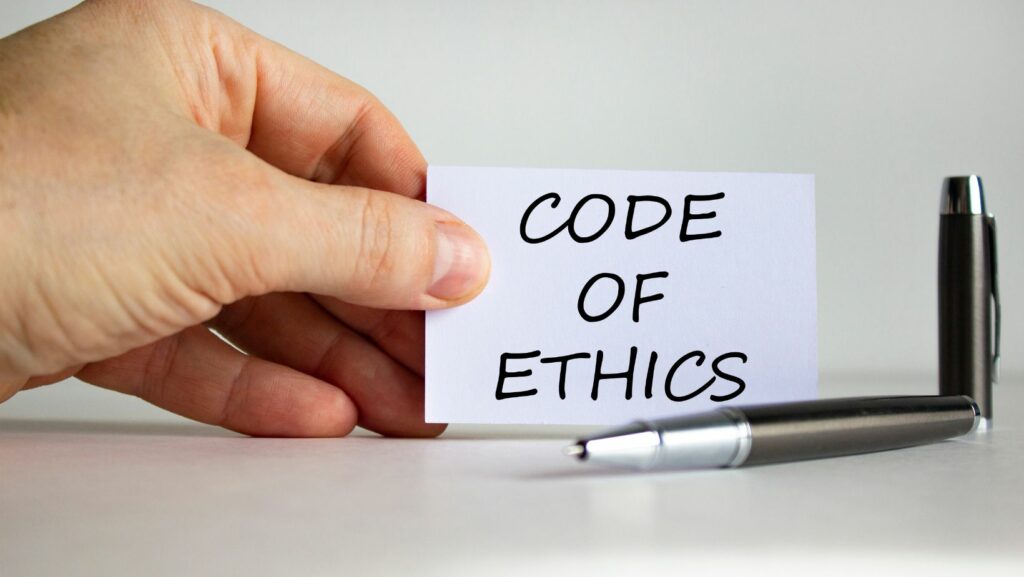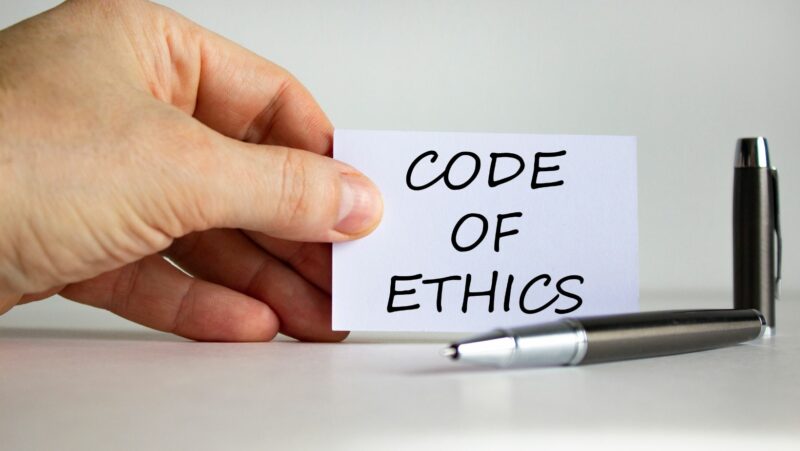
An Ethical Code of Conduct is Not
When it comes to discussing an ethical code of conduct, it’s important to dispel any misconceptions that may arise. Here are a few key points to understand what an ethical code of conduct is not:
1. A rigid set of rules: An ethical code of conduct is not simply a list of rules to follow. While it does provide guidelines for behavior, it goes beyond mere compliance. It serves as a moral compass, guiding individuals and organizations to make ethical decisions in both simple and complex situations.
2. A document that sits on a shelf: An ethical code of conduct is far from a passive document collecting dust on a shelf. It’s a living document that evolves with the organization. It should be regularly reviewed, updated, and communicated to ensure it remains relevant and aligned with the organization’s values, industry standards, and regulatory requirements.
3. A one-size-fits-all solution: Every organization is unique, and their ethical code of conduct should reflect their specific needs and values. It should be tailored to their industry, culture, and the ethical challenges they may face. An ethical code of conduct is not a generic template; it should be customized to fit the organization’s specific circumstances.
4. A substitute for individual judgment: While an ethical code of conduct provides guidance, it does not replace individual judgment and responsibility. It cannot account for every possible situation, so it’s important for individuals to exercise critical thinking and ethical decision-making skills. An ethical code of conduct serves as a framework, but individuals must still demonstrate personal accountability and judgment.
5. A guarantee of ethical behavior: Having an ethical code of conduct does not automatically mean that all individuals will act ethically. It provides a foundation and sets expectations, but individuals must actively choose to embody and uphold the values outlined in the code. Ethical behavior is a result of conscious choices and personal commitment.
What is an Ethical Code of Conduct?
Definition
An ethical code of conduct is a set of principles and guidelines that outline the expected behavior and standards of conduct for individuals within an organization. It serves as a framework that helps guide decision-making, actions, and interactions in a way that is aligned with the organization’s values and promotes ethical behavior.
Purpose
The purpose of an ethical code of conduct is to provide a reference point for individuals to understand what is expected of them in terms of ethical behavior. It sets out the boundaries of acceptable behavior and provides guidance on how to handle ethical dilemmas and conflicts of interest. By establishing clear expectations, it helps create a culture of integrity, accountability, and ethical decision-making within the organization.
The key purposes of an ethical code of conduct are:
- Guiding behavior: It provides individuals with a moral compass that helps them navigate complex situations and make decisions that are consistent with the organization’s ethical values.
- Setting standards: It establishes a common set of standards for behavior that can be used to hold individuals accountable for their actions and ensure consistency across the organization.
- Building trust: It fosters trust among stakeholders, including employees, customers, partners, and the community, by demonstrating a commitment to ethical practices and values.
- Mitigating risks: It helps identify and address potential ethical risks and conflicts early on, reducing the likelihood of unethical behavior and its associated consequences.
- Promoting a positive culture: It contributes to the development of a positive organizational culture that encourages ethical behavior, open communication, and a commitment to doing the right thing.
The Importance of an Ethical Code of Conduct
Establishing Trust
An ethical code of conduct is not just a document that outlines expected behavior, but it plays a crucial role in establishing trust within an organization. When employees have a clear understanding of what is expected of them in terms of ethical behavior, they are more likely to trust in the organization’s values and principles. This trust can foster stronger working relationships, enhance collaboration, and create a positive work culture.
Promoting Accountability
One of the key purposes of an ethical code of conduct is to promote accountability. By clearly defining the standards of behavior, an ethical code of conduct ensures that individuals are held responsible for their actions. It helps in preventing unethical behavior by providing guidelines and consequences for wrongdoing. This promotes a sense of responsibility and ownership among employees, leading to a more accountable and transparent organization.
Fostering a Positive Work Environment
An ethical code of conduct is not just a set of rules, but it also plays a crucial role in fostering a positive work environment. When employees feel that fairness, respect, and integrity are valued within the organization, they are more likely to be satisfied and motivated in their work. This positive work environment can lead to increased productivity, improved employee morale, and reduced conflicts. By promoting ethical behavior, an ethical code of conduct helps in creating a culture of trust, respect, and collaboration.
Conclusion
In today’s complex business landscape, having an ethical code of conduct is crucial for any organization. It provides clear guidelines that promote integrity, trust, and accountability among employees. As discussed in this article, an effective code of conduct consists of three key components. By implementing these three components, organizations can foster a culture of ethics and integrity, ultimately leading to increased trust, loyalty, and success. An ethical code of conduct serves as a compass, guiding employees towards ethical decision-making and promoting a positive organizational culture.















